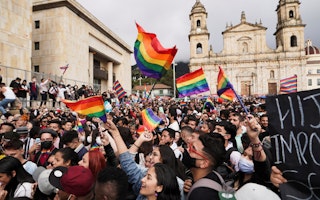After U.S. Equal Marriage Win, the Global Struggle Continues
By Michael Heflin

Growing up in a small town in Michigan, being gay was seen by most as simply wrong. So, like many young LGBTI people, I sought to hide my identity out of shame and fear of harassment or even violence. I could not dream of a day when marriage equality would be achieved for same-sex couples. Even as a college student becoming active as a human rights and LGBT rights activist, marriage equality in my lifetime was inconceivable.
So, when the Supreme Court of the United States ruled on June 26 that denying same-sex couples the right to marry is unconstitutional, it was somewhat surreal—after all, the United States only decriminalized homosexual conduct in 2003. The U.S. decision came just weeks after Ireland’s historic referendum on May 22, which saw that country become the first in the world to legalize same-sex marriage by popular vote. The United States and Ireland join nearly 20 countries that now recognize full marriage equality—the result of the efforts and dedication of many, their willingness to take risks, and their unfailing belief that the impossible was possible.
But even as we celebrate these historic human rights victories, we must not forget that there remains a tremendous amount of work to be done throughout the world before LGBTI people everywhere are truly equal. In nearly 40 percent of the world’s countries, homosexual conduct between consenting adults is still criminal and punishable by imprisonment, torture, and even death. LGBTI people continue to face widespread stigmatization, discrimination, and violence—shunned by family and friends, denied housing and employment, and attacked, both emotionally and physically. LGBTI youth face violence at home and in school, leaving a disproportionate number of them on the streets, homeless and without hope.
In my work with the Open Society Human Rights Initiative, I have had the great privilege of meeting and working with LGBTI activists in more than 50 countries. Whether in Mozambique, Russia, Poland, China, or Chile, these remarkably courageous individuals are all fighting for the same thing: they want their communities to be free from the homophobia, violence, and discrimination that prevent LGBTI people (and, in many places, those who support them) from living their lives openly with dignity and respect. Even in countries where LGBTI rights protections are enshrined in law, too many still suffer in silence, marginalized even by their peers within the LGBTI community—the homeless, people of color, immigrants and refugees, and transgender and intersex people, among others. In short, we still have a long way to go.
On September 3, 2011, I married my husband at a beautiful ceremony outside Sitges, Spain, a country that legalized same-sex marriage in 2005. It was a life-transforming moment—a moment to recognize the love we share and to have that love celebrated by our friends and family. It was an acknowledgment that our relationship, our commitment to each other, is equal to that of others. Unfortunately, too many LGBTI people around the world will go to sleep tonight not with dreams of marriage or equality, but dreading yet another day of life in the closet or fearing for their very survival. To them, the recent victories in Ireland and the U.S. may seem too far removed from their daily reality. But when I think about the great progress that has happened in my lifetime, and the diverse, creative, and inspiring people who work against seemingly insurmountable odds in so many places across the globe, I see reason for hope. Our work is unfinished. Let us rededicate ourselves to it.

Until November 2021, Michael Heflin was the director of equality for the Open Society Human Rights Initiative.


